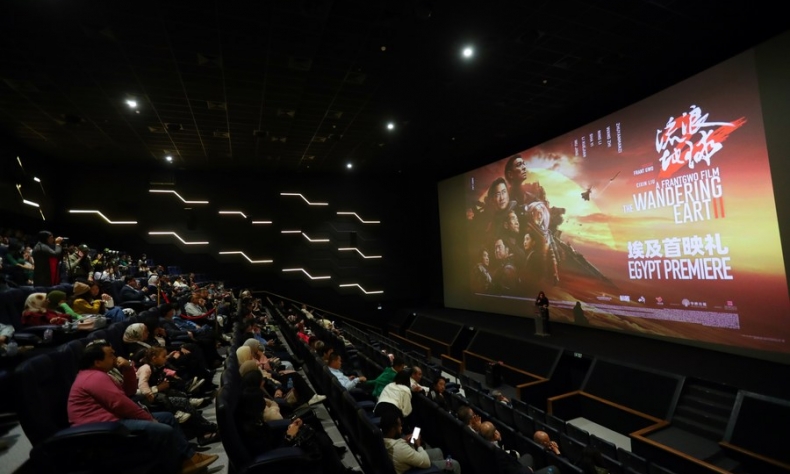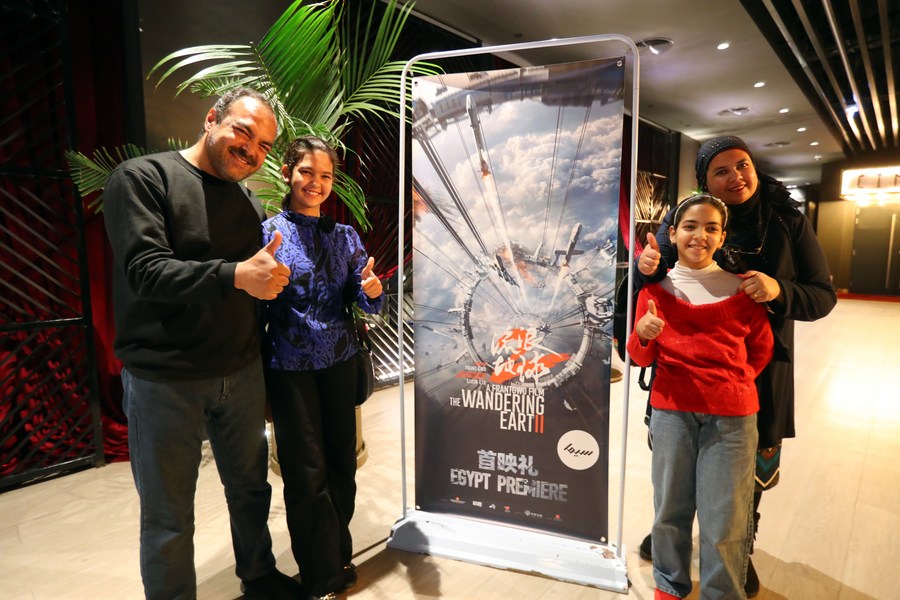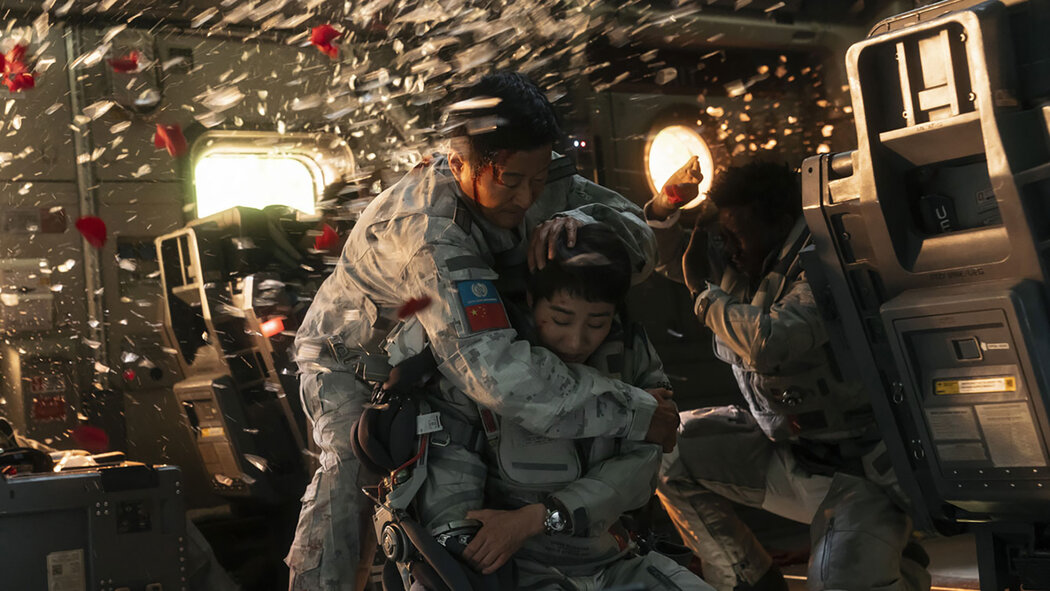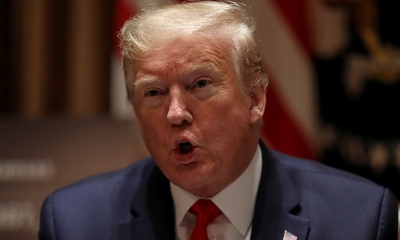The Wandering Earth II: Unity Is an Eternal Theme of Humanity

Overall, against the complicated international scenario, The Wandering Earth II encourages each one of us to jointly guard the unity that binds all of humanity together.
The Wandering Earth II, the latest Chinese science fiction blockbuster, has not only performed well at the domestic box office during Spring Festival, but also garnered increasing attention and success overseas.
After its release in overseas theaters, The Wandering Earth II received positive ratings, with a 78 percent approval rating from professional critics and a 97 percent popularity rating from audiences on Rotten Tomatoes. According to Screen Daily, “there is definitely a lot to admire about this ambitious, locally-produced science-fiction epic.” Fiction Horizon believes that the film deserves praise for striking a proper balance between sentiment and spectacle, elevating it to new levels. The Gate, a Canadian website dedicated to movie and TV show news and reviews, has described the film as “a rousing and bombastic bit of apocalyptic disaster movie goodness”. Despite this, some mainstream Western media outlets have criticized the film unfairly. According to Metacritic, two of the lowest ratings from professional critics came from the New York Times and the Guardian.
The film, directed by Frant Gwo, is actually a prequel of The Wandering Earth I the 2019 sci-fi blockbuster which is regarded as a mark for opening a new epoch of Chinese sci-fi movies. Unlike The Wandering Earth I which was adapted from the famous Chinese sci-fi writer Liu Cixin’s novel of the same name, the story of the prequel episode is almost created by the film production team, with no relations to the novel.
Both the two episodes are based on the same fiction that a disaster caused by the Sun is set to happen in the future. In the novel, the Sun is predicted to explode by scientists and the Earth will be destructed by the roaring flames of the Sun. To confront the solar crisis that will arise in 100 years, the United Earth Government (UEG) is established. The Moving Mountain Project is ultimately chosen as the solution. The purpose of this project is to save the Earth from the Sun’s rapid expansion by moving it out of the solar system. However, as the plan proceeds, doubts, opposition, and conflicts escalate from all over the world. The two factions between the pro-physical world and the pro-virtual digital world have a conflict finally that pushes the entire world to the brink of destruction. The film not only shows human’s efforts to save the Earth, but also tells a story of the struggle between humanity and artificial intelligence.

The sequel is doing more wonders than the first one
Based on the success of the first episode, The Wandering Earth II has a further development in terms of showcasing China’s industrial level, making a deeper exploration of its worldview, and depicting more sophisticated characters compared to its predecessor.
Over 90 percent of the scenes in the film were filmed in Qingdao, Shandong Province, a city that was awarded the title of “Film Capital” by the United Nations. One of the locations used was the Oriental Movie Metropolis, a Film & TV Industrial Park that boasts world-class studios, scenic workshops, and the largest virtual filming production platform in Asia, providing international-level hardware facilities and services to film and television crews from around the world. It was these resources that enabled The Wandering Earth II to visualize the script through previews, which is an important way to industrialize the movie. In addition, the film also successfully created sci-fi spectacles such as the space elevator, the Ark International Space Station, and the drone strike group. This demonstrates a new level of Chinese film-making technology.
Compared to the first episode, The Wandering Earth II has a more ambitious and intricate depiction of its world, encompassing aspects such as the astronomical calendar, geography, and way of life. For instance, the timekeeping system was altered from 24 hours to 60 hours after the Earth stopped rotating. This was deduced and calculated with the help of a team of professional scientists.
Regarding characters development, the film moves beyond the flat and stereotypical characterization model and presents more dimensions. Even heroic characters have the same emotions as ordinary people and sometimes make the same choices. For instance, Tu Hengyu is depicted as having a bit of selfishness and an obsession with his research on digital life, making his character seem more reasonable and believable.
Upon its release in hundreds of theaters in North America, the United Kingdom, Australia, New Zealand, and so on, the film not only received a good rating on Rotten Tomatoes, but also received an 8/10 rating on IMDb. Unfortunately, some mainstream Western media outlets reviewed the film with a biased perspective and gave it less than impartial ratings. The Guardian, for instance, scored the film 40/100 and described certain elements of the film as “oddly unsettling.” The New York Times, gave the film a low score of 30/100, criticizing it for its “conspicuously nationalist messaging” and “glaringly state-approved political subtext”. One overseas viewer who had not seen the film commented in curiosity about what these supposed state-approved story elements were. This undoubtedly perpetuates the stereotype of Chinese films and continues to spread it through film reviews.

The film bolsters the common values of humanity
The Hollywood film industry has achieved global success through commercial blockbusters with sci-fi movies accounting for an important proportion, which are featured with fantastic imagination, advanced filming technology and sophisticated story telling. In Hollywood films, the U.S. always plays the leading role or even the only role in saving humanity and the earth from extreme catastrophe, such as alien invasion, comets impacting, global volcanic eruption and so on. Today, with the greatly-improved technologies and award-winning sci-fi novels, China has been joining in the sci-fi segment and telling a different story.
The story of The Wandering Earth series centers around the collaboration of all humanity to save their shared future in face of unprecedented disasters, highlighting cooperation among different nations and civilizations. The film showcases universal values such as love, affection, and friendship, as well as the Chinese values of philosophical discernment. The title “The Moving Mountain Project” is inspired by an ancient Chinese tale, signifying that it takes courage and hard work of each generation to reach ambitious goals. In the second episode, Chinese representative Zhou Zhezhi delivers a speech at the UEG Conference, using a 15,000-year-old human femur fossil that broke and healed as a metaphor to stress “in times of crisis, duty above all”. He highlights that it is human unity and solidarity that sustains civilization and elevates the film’s values to their global pertinence. What is worth mentioning is that since the film’s theme is world peace and unity, scenes featuring the United Nations headquarters building located in New York City were filmed on location with the permission of relevant UN departments.
As the series director Frant Gwo (Guo Fan) said, the central theme of The Wandering Earth II is unity. Throughout the film, people from Hangzhou, New York, Paris, Edinburgh, Florence, Kolkata, Reykjavik, and Brazzaville are all concerned about the fate of the Earth together. At the end of the movie, Liu Peiqiang asks the artificial intelligence MOSS, “Will mankind survive?” MOSS responds, “Looking through human history, the fates of civilizations have always been dictated by the choices men make.” Given the current COVID-19 pandemic, climate crisis, regional conflicts, and other complex international situations, it is imperative for human beings to be more conscious of the need for unity and cooperation.
Overall, against the complicated international scenario, The Wandering Earth II encourages each one of us to jointly guard the unity that binds all of humanity together. Countries around the world should choose to collaborate with one another to build a community with a shared future for mankind and create a new model for human progress.
Co-author: Yuan Mengchu, Shandong University
Copy Editors: Bai Shi and Niu Huiying
The article reflects the author’s opinions, and not necessarily the views of China Focus.
 Facebook
Facebook
 Twitter
Twitter
 Linkedin
Linkedin
 Google +
Google +





